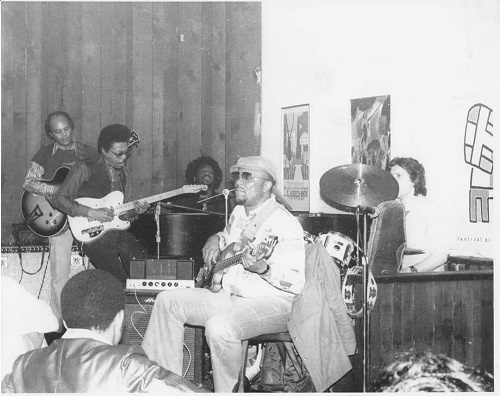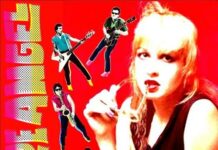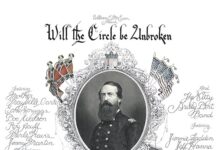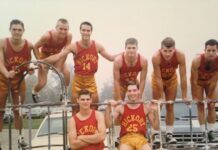Photos courtesy of Chris Parker
Often throughout music history, we herald bands that showcase an enigmatic or dynamic frontman (or frontwoman) or put flash and pomp before substance. While this, more often than not, helps the group climb the ladder faster to fortune and fame, it can also create tension within the band itself as the focus is placed on who is most visible — not who has the most virtuosity.
But then there’s the other aspect of this we may not think about as often — what if there is no frontman or frontwoman per se but the total music collective produces a terrific whole, even if you are unsure of who is actually making up the parts. The Wrecking Crew and the Funk Brothers are two immediate examples that come to mind. Think about all the albums that have been classified as the greatest of all time, chock full of musicians who aren’t official band members but who were specifically chosen to put their own unique stamp on the work (I’m looking at you Aja and Pet Sounds!).
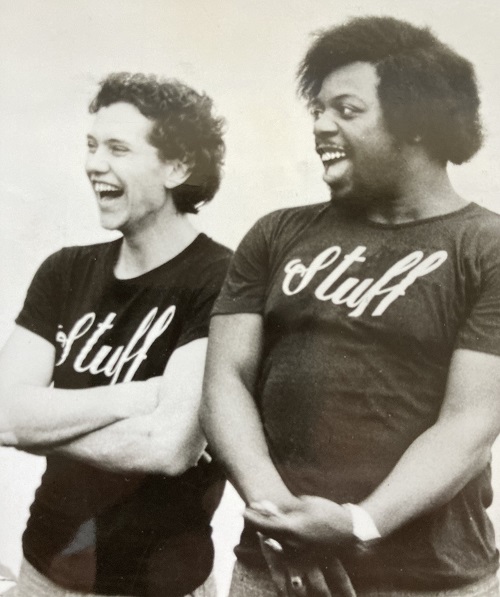
One of the more professional and wholly underrated groups to come out of the 1970s, the multi-talented Stuff proved you could be comprised of insurmountable talent behind the scenes but establish just as much presence when stepping out onto a stage and into the limelight. You may recognize the faces, perhaps the names more, but it’s impossible to overlook just how group members are literally the stuff of music royalty. For example:
- Keyboardist Richard Tee played on Peter Gabriel’s “In Your Eyes,” Paul Simon’s “Slip Slidin’ Away,” Bill Withers’ “Just the Two of Us,” and Billy Joel’s “Tell Her About It.”
- Guitarists Eric Gale and Cornell Dupree played on successful albums from Aretha Franklin; Gale also make key musical contributions to standout albums from Roberta Flack (Chapter Two, Roberta Flack & Donny Hathaway, Killing Me Softly)
- Drummer Steve Gadd … I simply don’t have enough time to describe who he has collaborated with over the past six decades…
While Warner Bros. would release six albums from the band (including two live albums and one compilation), their first two — 1976’s Stuff and 1977’s More Stuff arguably stand out as the best of the bunch. In 1978, the band would receive a Grammy nomination for Best R&B Instrumental Performance for the latter album. I mean their version of Stevie Wonder’s “As” alone — wow!
Even though you may know nothing about the group, chances are high you’ve seen Stuff members in two distinctive visual ways. First, there’s a now legendary Saturday Night Live segment of yore where English bluesman Joe Cocker is suddenly joined by comedian John Belushi to rasp through “Feelin’ Alright.” Both wear T-shirts with the Stuff logo emblazoned on them (as the group actually plays behind them).
Then, just a few years later, group members (Tee, Gale, and Gadd joined by soon-to-be legendary bassist Tony Levin) would receive ample screen time as Paul Simon’s (playing the character Jonah Levin) backing band in the underrated 1980 film One Trick Pony. The music comprising the film’s soundtrack (in particular tracks like “God Bless the Absentee”) is riddled with the Stuff sound — jazzy Wes Montgomery and George Bensonesque guitar, shuffled drumming, talking bass, and twinkling keyboard notes throughout.
“I was a fan of the individuals who I knew from my record collection. Cornell Dupree, Richard Tee, and Gordon Edwards were all guys that I kind of knew from the backs of albums,” recalls Stuff drummer Chris Parker. “I loved those sounds and those players.”
The impetus for “Stuff” to fully formalize is members congregating at New York City jazz club Mikell’s, a popular venue for the city’s top studio and session musicians who would turn up for jam sessions with major soul, funk, and jazz artists who came to town. Stuff would make the venue a near-weekly must on their calendar in the 1970s. Before the name “Stuff” was chosen, the group dubbed themselves the “Encyclopedias of Soul,” according to Parker.
“John Belushi had been coming to Mikell’s night after night watching the band. Joe Cocker was in town and came up to sit with us. Billy Joel would come in, Chevy Chase — a lot of folks came to the club and hung out. We were just playing basically instrumental versions of what we heard on the jukebox, tunes Eric Gale had written like “How Long Will It Last?,” Parker told me. “Cornell had an album and songs he used to play with King Curtis; we would incorporate it into the set. We also played traditional songs. We played ‘Dixie.’ We used to play standards like ‘Up On The Roof,’ Earth, Wind, and Fire tunes, Aretha Franklin tunes. We started playing ‘Love The One You’re With’ by Stephen Stills, ‘Signed, Sealed, Delivered’ by Stevie Wonder, ‘Nothing From Nothing’ by Billy Preston. We could play anything. We could play our version of anything.
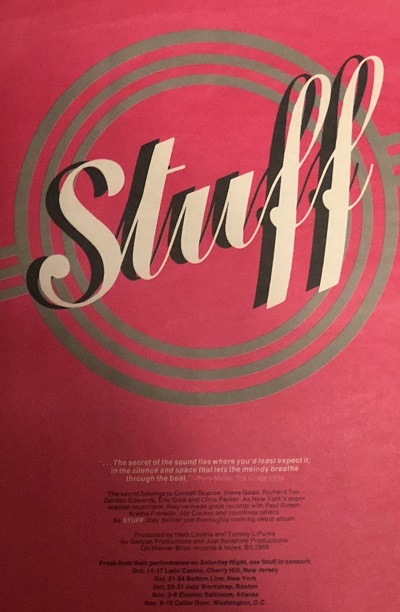
“That’s where Gordon and Richard and Cornell called everybody ‘Stuffy.’ It was like calling somebody ‘Guy’ — ‘Hey guy!’ We played maybe four nights a week, sometimes 14 nights in a row depending on who else was booked at the club,” Parker adds. “The group name became Stuff because that’s what everybody called each other. It just sort of evolved into what the name of the band should be. The band got more popular, and it wasn’t really the Encyclopedias of Soul anymore.”
In further developing its own catalog of tunes, Stuff picked up its own sense of groove a la tracks like “My Sweetness,” “(Do You) Want Some of This,” “How Long Will It Last?,” and “Sun Song.” A truly professional outfit where no one member proclaimed themselves superior over another, the sextet would also be interchangeable ─ it wasn’t uncommon for members to dip in and out when it came to gigs based on existing musical commitments.
“I asked (Steve) to sub for me. They loved Steve’s playing. He would play when I was out of town,” Parker said. “Gordon said, ‘I want the both of you.’ So it was two sets of drums. That was the real complete band – two drummers, two guitars, bass, and piano.”
Eventually Warner Bros. (the future home of Paul Simon) would enter the picture with a record deal.
“When we realized there was a record deal, we wanted to write original material for it as well and even more on the second album,” Parker said. “Everybody had tunes — ‘And Here You Are,’ ‘This One’s For You.’ Cornell brought in ‘Subway.’ After the first record everybody said, ‘Let’s write for this band’ and we wrote more original material.”
Yet despite growing success, high studio and live demand for individual band members would prevent Stuff from undertaking major tours, according to Parker.
“We didn’t really tour. We did a couple of TV shows. We did a special with Chevy Chase where we went to LA,” he said. “We did a couple of concerts where we were headliners around New York. What happened was people became aware of the band and became enamored of it. [Producer] Tom Scott from LA came and said, ‘I want to put something together and I’ll take Eric and Richard.’ Paul Simon said, ‘I’ll take Richard, Steve, and Eric.’ Different people decided they could use this band but not the whole band — usually the three guys. Everybody became like horse trainers with jockeys: ‘I’ll put this horse with this jockey and make it better.’ That ultimately led to the dissolution of the band. The six guys weren’t consistently available. We did lots of gigs where it was iterations of different folks.
“Everybody understood about each other’s commitments,” Parker adds. “Sometimes it was heartbreaking. We had offers to do things but not everyone could make it. Once we got to a certain point, anyone missing diluted the sound.”
After its first two albums, Stuff would release their third studio album Stuff It! in 1979 before members went separate ways. But Parker is quick to add that there never existed any hard feelings between group members themselves. For additional context, he also offered his own individual assessment on each member’s personality and talent within the scope of the overall band:
- Gordon Edwards: “(Gordon) was definitely the leader and the orchestrator and the quarterback. Gordon would get the ball and direct what was going to happen next, and the segues are legendary. People could not get the drink to their mouths to take a sip because they were grooving so hard. That was the ideal criteria — if they groove so hard that they can’t get the drink to their lips, that’s the ideal. He was a commanding presence. Not a super flashy bass player but a solid bass player. He would dictate from his bass and personality what we play next: ‘Here’s the tempo and the tune,’ and we may suddenly segue into something else. That was based on his direction.”
- Cornell Dupree: “Cornell was a great accompanying guitarist. He was basically the vocalist. He would play the melodies of the tunes. He was a very gentle soul and very musical. His playing was like the lead voice.”
- Richard Tee: “Richard was a commanding presence as well and a solid personality. Very funny — always very jovial and positive. Richard had an interesting wardrobe. He would wear a denim jacket and a denim hat that said on the front ‘Kiss me quick, I’m coming’ and on the back it said, ‘Kiss my ass, I’m going.’ He was always very positive and on a good night if I had been practicing and played well, he would say, ‘You’re doing your homework, Stuffy.’ That was high praise from him. Or he would call me ‘Junior.’ I was always the youngest guy in the band.”
- Eric Gale: “Eric Gale was inscrutable. Things had to be neat and really precisely in tune. He was very fastidious about his guitar and his playing and his intonation. He would complement whatever Cornell was playing in terms of rhythm. He would solo as well; he had a very distinctive solo sound — more like B.B. King or Albert King. He had a fat body guitar while Cornell had a Telecaster — two different guitar sounds.”
- Steve Gadd: “Steve is a consummate musician, an unbelievable drummer — probably the best of our generation; probably the best ever given his innate sense of time. When we played together for the first time, it was magical. We never discussed what we would play. We would complement each other and concentrate on the groove and play that groove with conviction. That was the whole deal with him. He graduated from Eastman [School of Music] and played a lot of jazz before he played with Stuff. He and Richard really connected and he and I really connected. Beautiful cat, beautiful musician, fantastic drummer — just magical to play with him.”
It’s therefore important to not be quick to label or deduce Stuff as just another backing band. Despite the untimely deaths of half of its members (Tee in 1993, Gale in 1994, and Dupree in 2011), it’s not often that a democratic collective such as this can simultaneously transcend genres within their own work while making the already established legends perk their ears up in attention.
“Whatever we took on, we put our own stamp on it. It was really six individual personalities that made it work. Everybody was respectful of each other and complemented each other’s talents,” Parker says. “An astrologer said that’s why it worked because Cornell, Richard, and I are all Sagittarius, Eric is a Virgo, Gordon is a Pisces, and Steve is an Aries. It all worked.”
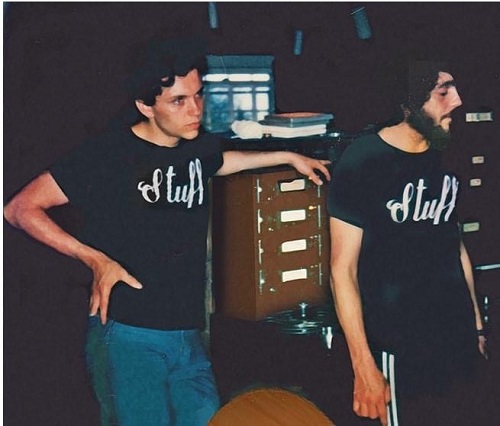
***
Share your feedback and suggestions for future columns with Ira at vinylconfessions84@gmail.com. Ira’s new book, “Hello, Honey, It’s Me”: The Story of Harry Chapin, is available for purchase here.


